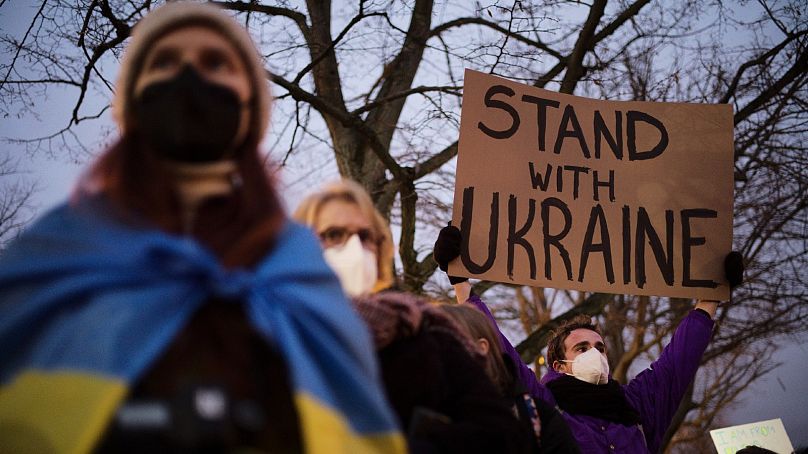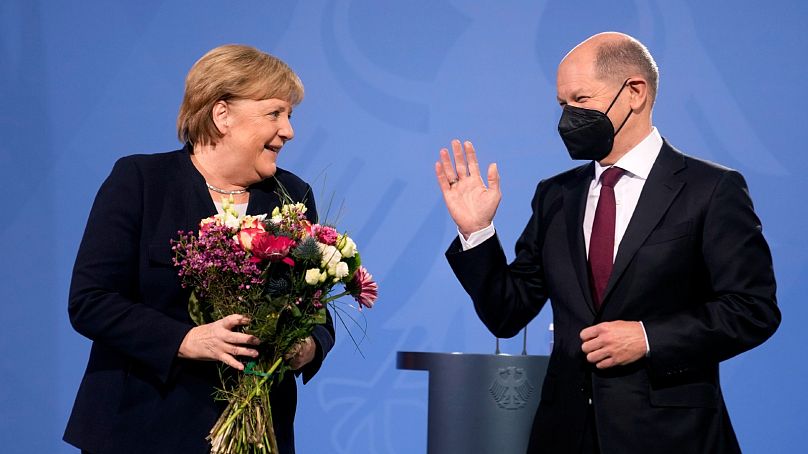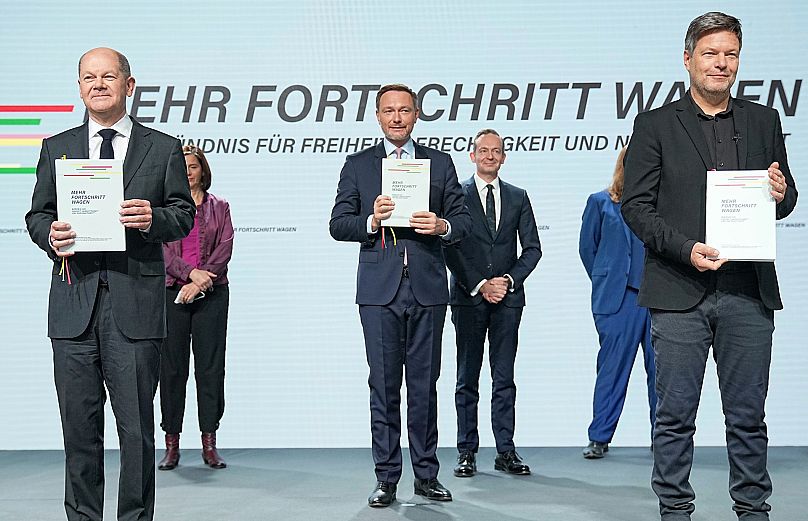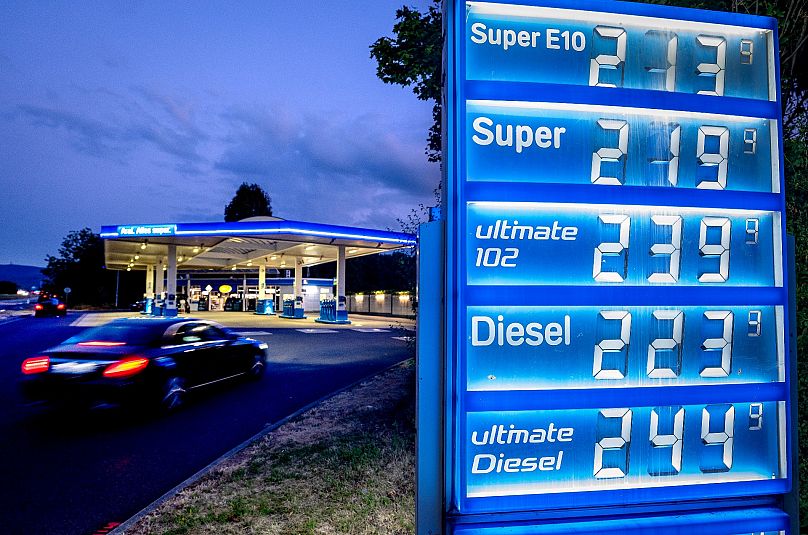Scholz was sworn in as Germany's new chancellor on 8 December 2021.
Olaf Scholz has not been dealt the best of hands. Replacing Angela Merkel after her 16 years of steady -- if staid -- rule was never going to be easy.
Doing so in the midst of a brutal confluence of crises ranging from a war in Europe, the pandemic and exploding inflation has only made that job more difficult.
While Merkel was seen as a tough act to follow, the first year of Scholz’s term has represented a significantly more seismic shift away from the Merkel era than anyone could have expected.
Merkel navigated her own web of crises with unflappable calm, quietly and confidently exuding an aura that her way was the only possible one – whether you agreed with her or not.
Scholz doesn’t have quite the same "Mutti" vibe.
While coming off as a competent -- if sometimes technocratic -- manager, he can bristle when pushed and has been accused of having an arrogant approach to communication.
He hasn’t just separated himself from the Merkel years stylistically.
In some ways, nearly two decades of conservative rule means nearly any progressive legislation at all is enough to set the Scholz government apart.
Elsewhere, foreign policy and energy crises have made disentangling Germany from decades of poor choices more difficult.
All this has occurred within the confines of an often awkward three-way coalition between Scholz’s centre-left SPD, the Greens, and the liberal FDP.
For better or worse, for the first time in a long time, German politics are interesting again.
“The last year has been insane. Absolutely insane,” Rasha Nasr, 29, an SPD member of parliament representing Dresden told Euronews, speaking about his first legislative period.
1. A sea change in foreign policy
Scholz’s defining policy to date wasn’t a promised campaign reform, but an initially-reluctant response to Russia’s invasion of Ukraine.
In February, Scholz made a momentous speech to Germany’s parliament, calling for an “epochal change” to German foreign policy and committing €100 billion to modernise Germany’s military, while supporting Ukraine and breaking off German reliance on Russian energy.
Scholz wasn’t exaggerating by calling this commitment a sea change – Germany’s militarisation reflects an abrupt end to the country’s postwar consensus and has reinvigorated longstanding debates about Germany’s history, identity and role in the world.
It was such a break that it even caught members of Scholz’s party off guard.
“It’s no secret that many of us – in fact nearly all of us – did not know that Scholz was going to call for €100 billion in funding for the armed forces,” Nasr told Euronews.
“I was shocked, though I did vote in favour of it.”
For decades, Germany has been slow to invest in its military and hesitant to send weapons to active conflicts. This reluctant approach to military spending was anchored in the lessons of the horrors of World War II. German public opinion has long been sceptical of expanding the country’s military.
“Germany has a lot of historical baggage. They want to be seen as responsible actors on the world stage and not as aggressors,” Aaron Allen, a researcher at the Center for European Policy Analysis, told Euronews.
This reluctance to invest in defence often frustrated allies hoping Europe’s largest economy would play a bigger role in European defence policy.
“Russia’s invasion of Ukraine was the impetus and push that many people saw was needed for Germany’s political class to do things that others have wanted for a very long time, and what many of them wanted to do themselves but either they didn’t have the political will or support from the German public,” said Allen.
Russia’s invasion of Ukraine shocked German policymakers, who had hoped to placate Vladimir Putin via trade entanglements. The war ignited a renewed debate about military spending, and for some, recast the understanding of the lessons of WW2. Many argued that instead of Germany demilitarising, maybe it should take a more active role in stopping belligerent nations.
Public opinion in Germany is roughly evenly split on sending heavy weapons to Ukraine, a level of approval for military support that would have been unimaginable prior to this conflict. Many allies have welcomed the shift.
“In France, it was perceived as a huge shift. Scholz’s speech was closely followed, and it was welcomed,” Jeremy Ross, an expert on Franco-German relations at the German Council on Foreign Relations, told Euronews.
“France sees itself as having long argued for a stronger German position, especially in foreign policy and defence. For years it has argued Germany should live up to its economic weight,” he continued.
In addition to the €100 billion one-time allotment to revitalise Germany’s military, Scholz has committed to meeting NATO's guideline of 2% of GDP spending going to defence. While Germany is frequently criticised for lagging below this goal, only 8 of NATO's 30 members reached it in 2021.
Scholz has the difficult task of appeasing allies, who are hopeful Germany will take an even more forward role in foreign policy and defence, and not move so quickly that he loses tenuous support for militarisation at home.
According to Ross, many in French policy circles are sceptical that the newfound defence spending represents a total change in Germany’s foreign policy structures, in part because Germany has committed to increasing defence spending in the past with little follow through.
“There have been a lot of weapons deliveries, which really is a big change from the past. But (in France) the perception of this cultural change as seen through the mindset of Germany’s foreign ministry, the defence ministry, and the armed forces remains to be seen,” said Ross.
As of now, Germany already provides the third-highest support for Ukraine in the world. If Germany truly commits to a long-term overhaul in its defence spending and practices – and public opinion continues to see this favourably – it will represent one of Germany’s biggest changes in recent history.
Allies’ concerns that there may be no follow-through may not truly be answered until after Scholz has left office, but he’s set something massive in motion.
2. Progressive reform on the domestic front
The Scholz government has also seen a dramatic break in domestic policy, though this might have more to do with the conservative nature of German social policy after 16 years of conservative rule than the new government’s radicalism.
“I think the last year has really shown what’s suddenly possible when the CDU are no longer in government,” Nasr told Euronews.
Since taking power, the ruling coalition has upped the hourly minimum wage to €12 – giving more than six million people a raise – and eliminated a Nazi-era law banning the "advertisement" of abortions.
Sweeping social welfare reform, which eliminates a controversial labour market and unemployment insurance programme from 2003’s Gerhard Schröder government, also passed.
“These policies send a great message because they demonstrate that politicians don’t just make promises, we can keep them,” said Nasr, who primarily focuses on social policies.
While these reforms have been a breath of fresh air for left-leaning organisations after the Merkel years, some argue that they are not adequate given the social and economic crises facing the country.
“The coalition presented its governing pact under the headline ‘Dare to Make More Progress’. Taking this progressive goal as the sole yardstick, the first year was disappointing because the government was preoccupied with maintaining the status quo," Dr Hans-Jürgen Urban, a member of the executive board of IG Metall, the largest industrial union in Europe, told Euronews.
“We don’t want to ignore the coalition’s successes. Avoiding further social cuts, and finally enacting long overdue reforms – like raising the minimum wage – are certainly positive steps. But they’re not nearly enough.”
Nasr herself agrees that the work isn’t done.
“Of course, it’s not enough. For example, no one needs to be thankful just to be earning the minimum wage. We want higher collectively-bargained wages, so we want to strengthen unions and worker’s councils as well. But this helps raise the floor,” she said.
A smattering of further progressive programmes is in the pipeline. This includes legalising marijuana and reforming Germany’s naturalisation process. But there are some indications that things may not go as quickly, or smoothly as expected. The social welfare reform was briefly held up by conservatives in the upper house, who forced the law to be tweaked by the coalition before passing it, indicating the CDU isn’t entirely out of the legislative equation.
Equally importantly, a fresh debate around the promised reforms to German citizenship laws – which will ease naturalization requirements and allow for dual citizenship – has broken out. The SPD and Greens aren’t only contending with critiques from the opposition in parliament, there has been loud pushback from members of the coalition partner FDP. If social democratic reforms are chipped away at from within and outside of the government, Scholz might not long be able to brag about his progressive politics.
3. From united front to patchwork partnership
Public disagreement within the government over citizenship reforms highlight a broader challenge dogging Scholz’s first year in office: the patch-work nature of the ruling three-way "traffic light" coalition.
The centre-left SPD and Greens are often at odds with the liberal FDP, meaning Germans have had to get used to squabbling and at times unfulfilling compromise.
“Germany hasn’t had a three-way coalition since the 1950s. You have a lot of cooks in the kitchen, which means a lot of disagreements on how to move forward. Though they have shown their ability to work with each other given their differences,” said Aaron Allen.
While the centre-right CDU and left-leaning SPD often made strange bedfellows in the Merkel grand coalitions, it was always clear who called the shots at the end of the day.
“It’s definitely a different government than it was under the grand coalition, that’s for sure. The SPD were junior partners. I wasn’t in government then, but it was clear how effective the CDU were, they essentially blackmailed the SPD (to pass their policies),” Nasr told Euronews.
It often felt like the SPD’s role was predominantly to stifle dissent and rubber stamp Merkel’s policies, and any form of progressive policies came at a cost. Possibly out of frustration with years as the CDU’s junior partner, the SPD has taken a different approach, trying to build compromise instead of ramming through their own agenda.
This has led to some uncomfortable moments. The FDP, most frequently through finance minister Christian Lindner, has publicly dissented from Green and SPD policy proposals on topics ranging from a windfall tax, capital tax on the super-rich, the aforementioned citizenship reform, and extending a popular public transit subsidy.
“The social and economic programs of the SPD and FDP are quite distant from one another. They already need to find common ground within the government, and that’s without even mentioning compromising with the opposition. That makes things really difficult,” said Urban.
“The need to compromise within their own coalition has meant that true structural reforms and redistributive shifts haven’t happened, even if they are badly needed,” he continued.
Nasr takes a more pragmatic view of cooperation within the coalition. “I’ll put it this way, it’s not exactly a romantic match, it’s more of a marriage of convenience. We’ve spent a year wrestling with one another but have passed a lot of great laws,” she said.
“Democracy lives from compromise. Sure, there are some compromises that we might not like quite as much, just as there are some that don’t totally please the FDP or the Greens. You don’t always have to love everything, but we decided when building the coalition to treat one another as three equal partners and to approach negotiations with trust and respect,” Nasr went on.
For now, the coalition has held together – if a bit awkwardly – in the face of multiple crises. Three more years of ongoing crises might just mean the internal contradictions are too much to bear and short-circuit the traffic light. Especially if the FDP begin to worry about losing support among their base and decide to distance themselves from their more left-leaning partners.
4. Keeping the gas flowing – at all costs
Energy policy, in particular, has been a hotbed for thorny negotiations, especially given the mismatched policy demands of the Greens and the car-loving FDP. The energy crisis has been another defining feature of the Scholz government. It’s yet another case where an external crisis, exacerbated by prior German policy, has reared its head. And here, too, Scholz has had a difficult time balancing popular domestic demands with the expectations of allies.
“I think there was a lot of naivete, particularly during the Merkel years. A lot of hard choices were kicked down the road,” Aaron Allen told Euronews, referring to Germany’s reliance on Russian gas.
German foreign economic policy has long been shaped by a framework of “change through trade”, where economic relations with authoritarian regimes were seen as a means of ushering in liberal reform. This served as a political justification for relatively close economic ties with Russia in recent years, with energy playing a key role.
Of course, this had a pragmatic element to it as well. Starting in earnest in the mid-2000s under the SPD’s Gerhard Schröder, and intensified under Merkel, Germany began importing Russian natural gas. Especially following the 2011 Fukushima disaster, where Germany largely moved away from nuclear energy, gas was seen as a good choice to bridge the gap between energy sources as it built out its renewable energy sector. Prior to Russia’s invasion of Ukraine, gas made up 27% of Germany’s total energy mix, with 55% of it being imported from Russia.
“Russian natural gas was a cheap alternative, especially for German industries. It was seen as a win, win, win politically: Germany could address climate change by transitioning its energy production; Germans kept Russia within the fold and maintained that relationship; and Germany had cheap natural gas that allowed them to continue to be an economic powerhouse,” said Allen.
“But now, it’s all crumbling. I think the Ukraine crisis has brought a lot of underlying tensions that have been around for a long time to the fore.”
Not only did the war force the newly elected Scholz to reassess Germany’s military policies the “change through trade” approach meant he also had to break Germany’s ties to Russia and scramble to find new energy sources. Germany’s massive energy demands have seen it rush to build liquid natural gas terminals and look to both neighbours and further afield gas producers like Qatar to make up for it.
With exploding energy prices compounding inflation, Scholz has not hesitated to spend to offset costs. From subsidising gas prices for car drivers and mass transit costs to an unexpected €200 billion energy price brake scheme, keeping gas flowing and businesses running has been a priority.
This has ruffled some feathers. Germany has been criticised for going its own way in dealing with the energy crisis, with neighbours frustrated Germany did not opt to help build a Europe-wide response. While Scholz’s government stepping in to offset costs for individuals and business has been hailed at home, it again has put him at odds internationally.
5. Germany’s unclear role in Europe
The energy dispute illustrates another shift under Scholz – Merkel’s Germany was seen as vital to the broader European project. Now, it seems Germany is content to strike its own path instead of playing a dominant role in Europe.
“Whatever one thinks about Merkel, when she was in power she had garnered a lot of respect and was seen as a kind of protector of the liberal international order,” said Allen.
While that perception has been severely damaged by the Ukraine crisis, Scholz hasn’t exactly announced himself as a global statesman in his first year in office. Franco-German relations, particularly important to European stability, are especially strained.
“Scholz is seen as less skilful or possibly not experienced enough yet to forge these personal relationships with other heads of state, which Merkel did really well. At least at the end of her term. And this actually weighs on bilateral relationships,” Jeremy Ross told Euronews.
While some of Scholz’s decisions, like his commitment to militarisation, have been welcomed by European allies, their implementation has drawn criticism. “These big new spending programs, the €100 billion fund for the armed forces or the €200 billion for energy price caps and household subsidies, were perceived as not being coordinated,” said Ross.
The largest economy in Europe independently pursuing energy goals puts pressure on other European nations, while France is particularly frustrated that some of the military spending under Scholz has gone towards American weapons systems, bucking existing plans for joint European projects.
“In defence, a number of decisions from the current government are interpreted from the French as stepping back from plans for Germany and France to work closer together to build a common European defence and industrial base to strengthen European sovereignty.”
Meanwhile, many in Eastern Europe, want even further commitment to continental defence, given their proximity to Russia.
“There’s an east-west divide. Eastern European countries would like to see Germany more forthrightly support armaments going to the east, and more of a commitment to protecting Eastern European members of NATO,” said Allen.
Scholz’s decision-making often comes off as a bit short-sighted – subsidies for gas score domestic points but at the cost of European relationships, while committing to spending on defence at the behest of Germany’s allies but following through in a way that only strains relations defeats the purpose.
Despite talk of an epochal change, the precise role Scholz wants Germany to play on the international stage remains unclear. No matter what, it’s unlikely he – or anyone – would be able to please everyone, but as of now, his policies are more reactive than representing a clear, coherent set of ideas.















